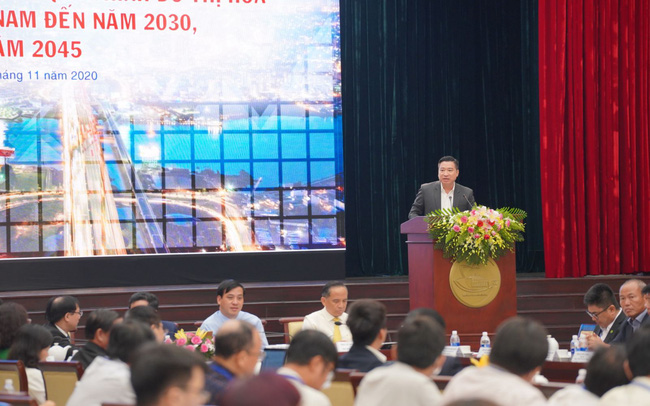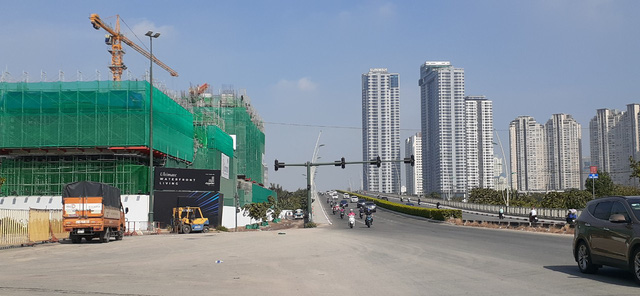At the seminar held on November 27 morning in Ho Chi Minh City, real estate enterprises continued to propose to solve the legal "knots" that was still hindering real estate project investment activities.

At the seminar, Mr. Nguyen Dinh Trung, Chairman of Hung Thinh Corporation recommended solutions to reform administrative procedures in the field of real estate investment and business, reform the method of determining financial obligations in terms of land use levy in the project; remove the inadequacies of non-residential land allocation in housing development projects.
According to Mr. Trung, Land Law 2013, Housing Law 2014, Real Estate Business Law 2014 and guiding documents issued by the National Assembly and the Government for the past decade had solved many problems and created basis for the development of the real estate market.
However, according to Mr. Trung, legal policies failed to keep pace to adjust all "new" real estate types, there were many gaps and inadequacies in application and interpretation of the laws by competent authorities for land management issues, investment procedures, procedures for determining the project's land use levy obligations, etc., which significantly affected the investment environment, contributed to reducing the supply and pushing up the selling prices of real estate products for recent times.
Mr. Trung said that in order to solve these problems and create conditions to promote the transparent and sustainable development of the real estate market, the Government needed to pay attention to specific issues such as: Reform of administrative procedures in the field of investment in real estate projects. According to Mr. Trung, on January 1, 2021, when the Investment Law 2020 would take effect, the investors who had the investment guidelines approved would not have to go through the "investment approval" procedure anymore as well as unify many concepts in the investment process to remove previous entanglements.

In addition, according to Mr. Trung, the Government should pay attention to providing more guidance on the settlement for investors to implement the procedures for applying for construction permit and assessing financial obligations on land use levy at the same time. At present, there was still a viewpoint that the land use levy must be completed before the construction permit was granted; or for issues related to social housing obligations, investors should choose the method of implementing in money or investing in social housing at the project instead of regulating mandatory cases according to the project scale from 10ha or more.
In addition, it’s necessary to reform the method of determining financial obligations on land use levy at the project. According to Chairman Hung Thinh, this procedure was very complicated in terms of the appraisal plan because it’s required to be qualitative based on market transactions, leading to the prolonging and non-transparency; the violations of the competent authorities for the past time, so far there had not been a really convincing solution for the problem.
Regarding this content, many associations and enterprises proposed the Government to consider the plan to determine land use levy according to the land unit price prescribed by the State multiplied by the coefficient to simplify the price determination process; profits of enterprises after selling to buyers must also be subject to corporate income tax as regulated.
In addition, consider removing the inadequacies of non-residential land allocation in housing development projects. According to Chairman Hung Thinh, in fact, there were many real estate projects with non-residential land, the reason was that although the investors compensated for site clearance of the entire land area, a high possibility was that there were still cases of land for roads, ponds, lakes, etc. The non-residential land had not yet recognized the land use rights for anyone within the project boundary, leading to problems with investment procedures because under the applicable regulations, this area must be auctioned before investors could have land allocated.
"Currently, some localities is proposing an auction plan for the area of "non-residential land" if it is large enough. In fact, the non-residential land has an uncertain shape, therefore if it is necessary to conduct an auction to allocate land to investors, many people will participate in auctions for the purpose of profiteering, which will negatively affect the policy of land law, accordingly, the Government needs to define what "public land" is, distinguish it from "non-residential land" without being managed by anyone so that there is a mechanism to allow investors to have non-residential land allocated to implement the project," Mr. Trung said.
Along with that, the Chairman recommended to improve the legal framework for the "new" types of real estate. As for condotel (tourist apartment), hotel apartment, etc., although the construction standards as well as the land law and the law on real estate business were promulgated, regulating the principles of the granting of ownership of "construction works" that are not residential houses, in fact many localities have been still confused when applying the legal basis to carry out procedures related to the trading, transfer of sales contracts and issuance of certificate of ownership to buyers.
Leading to the confusion for employers and investors, there are many dispute cases arising, according to Mr. Trung, this was the biggest obstacle that makes the tourism real estate type not able to develop smoothly, creating conditions to attract foreign investment capital.
According to cafef.vn




















 TOP
TOP